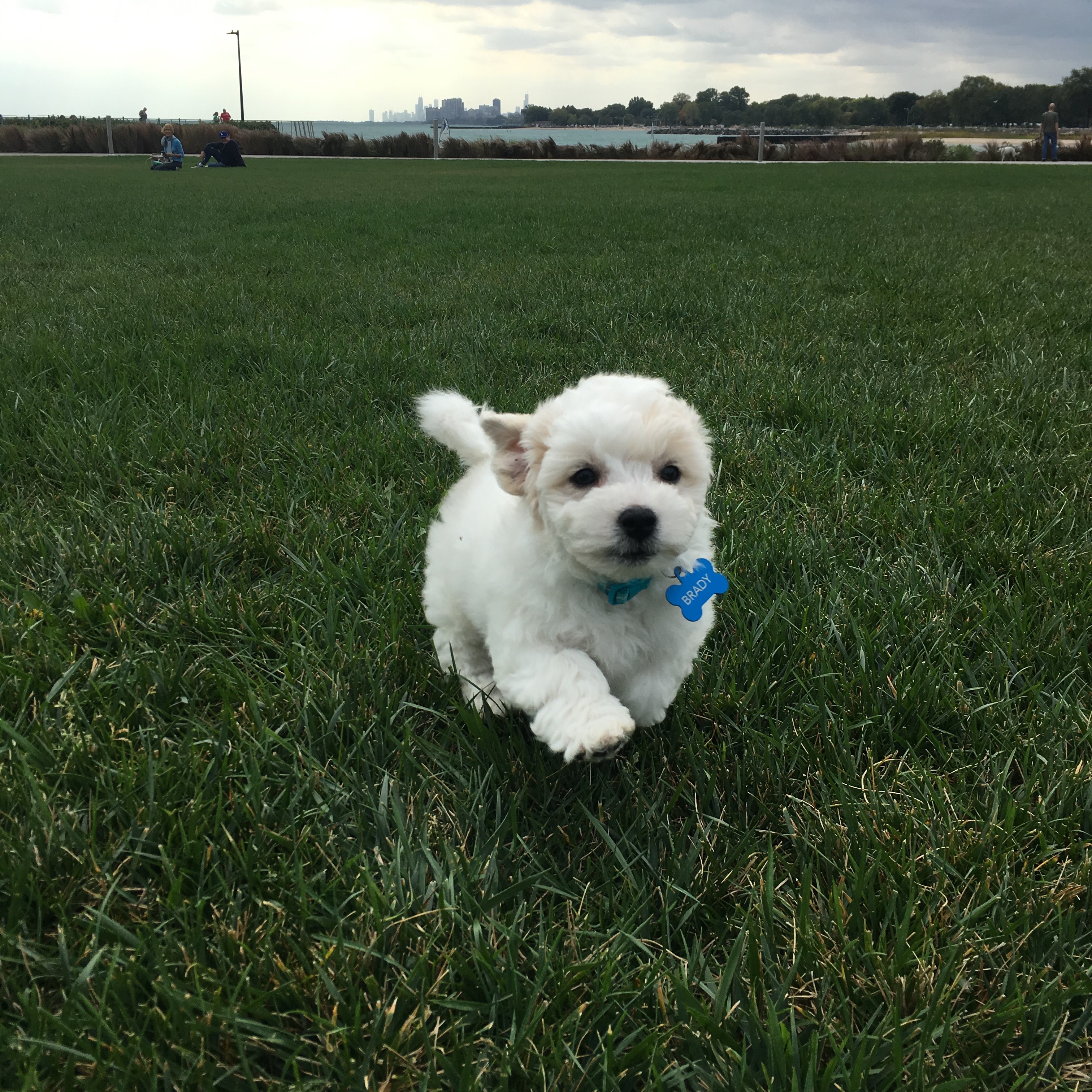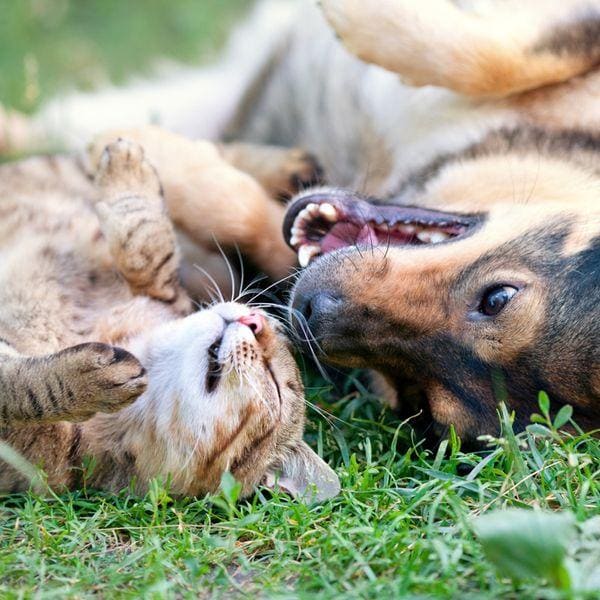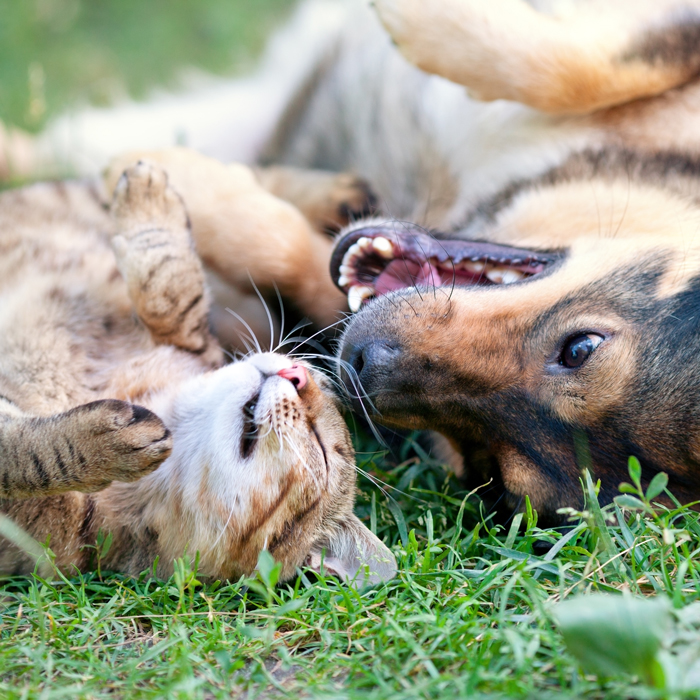Our pets are always around to brighten up the day and give us unconditional love. For most people, they are like family members. Our pets make us laugh when we are down, cuddle with us at night, and keep us company on the couch. And for the most part, they don’t ask for much in return — just a warm place to sleep, a tidy place to do their business, and something good to eat.

(Swanson Health office mascot Brady enjoying the park)
If you are like most people who love pets, you can’t imagine not having your pet around. You probably want to do everything you can to help your pet live a long and vibrant life. Thankfully there are ways you can help nurture your pet’s health to promote longevity, and they have a lot in common with how we nurture our own health. Here are eight longevity tips for pets.
1. Nurture Your Pets with a Nutritious Diet
Nutrition is the foundation for healthy living, both for you and your pets. You read the nutrition labels on your food, right? Don’t just go by what’s on the front of your pet food package, either. Take a closer look by reading the labels and checking the ingredient lists to make sure you are feeding your pet a high-quality diet.
A balanced diet for your pet may be very different from a balanced diet for you, so do some research and learn about species-appropriate diets for your pets. It’s always a good idea to see your pet’s veterinarian for help creating a healthy eating plan for your pet. The food and occasional treats that dogs and cats eat should include:
- High-quality, meat-based protein
- High levels of the omega-3 fatty acids EPA and DHA
- Good moisture content
- Very little to no grains or starches (dogs and cats are natural carnivores)
- Some vegetables, but dog and cat foods should not be primarily vegetable-based
Also, look for an approval statement on the label from a reliable organization that monitors pet nutrition like the Association of American Feed Control Officials (AAFCO). The U.S. Food and Drug Administration (FDA) monitors ingredients used by pet food manufacturers to make sure those ingredients are safe, and they keep an eye on labeling practices, but the FDA does not publish official nutritional guidelines for pets or make specific recommendations.1
2. Watch Your Pet’s Weight
Getting the right nutrition is essential, but weight control is also important for pets. Over the past 10 years, the number of overweight pets has increased by 169% for cats and 158% for dogs. As of 2016, 22 out of every 100 cats and about 18 out of every 100 dogs are overweight.2
Weight problems in pets can happen for a few reasons including overfeeding, lack of exercise, health concerns and breed-specific tendencies. Be sure to monitor portion control, be mindful of how many calories your pet consumes from both treats and food, and make sure your pet gets enough exercise.
3. Don’t Skip Veterinarian Appointments
It may be tempting to skip veterinarian visits if nothing seems to be wrong with your pet, but you should go anyway. Follow a veterinarian recommended vaccine schedule and take your pet for wellness checkups at least once a year, or as often as your veterinarian recommends.
As your pet ages, your veterinarian may schedule wellness checkups more frequently to help catch potential problems early. Diet and exercise recommendations to keep your pet healthy may change as your pet ages. Also, schedule teeth cleanings as needed and have your veterinarian show you how to keep your pet’s teeth clean at home.
4. Know the Health Concerns of Your Breed
Just as knowing your health heritage may help you get ahead of potential health concerns, understanding the health tendencies of your pet’s breed can help you and your veterinarian create a wellness plan for your pet. For example, some dog breeds tend to have hip and joint concerns, and others are prone to respiratory issues. If you are aware of what to look for in advance, you may be able to fend off potential problems before they become serious issues, or maybe even before the problems start at all, which may increase your pet’s longevity.
5. Add Pet Vitamins and Supplements if Needed
The right vitamins and supplements may help support your pet’s physical and mental health. It’s always best to check with your veterinarian before giving supplements to your pets, but here are a few of our most popular supplements for pet health.
- Glucosamine & Chondroitin with MSM for Dogs
- Brewer’s Yeast for Dogs and Cats – delivers B vitamins and amino acids
- Fido Calm – it tastes like peanut butter!
- Probiotics for Cats and Dogs – 14 strains of probiotics in one
- Omega 3 Fish Oil for Cats and Dogs – healthy omega 3 fatty acids (DHA and EPA) for cats and dogs
6. Exercise Your Pet’s Mind and Body
Exercise plays a significant role in the physical and mental well-being of your pet. It helps maintain strength, flexibility and a healthy weight and helps keep stress at bay. Most dogs need between 30 minutes and 2 hours of activity each day.3 That can vary depending on the breed, age, size and general health of your dog so check with your veterinarian if you're not sure. And most cats should get 10-15 minutes of activity a few times a day.4
Exercising your pet’s mind is important too, especially for dogs. Switch things up a little by teaching your pet a new trick, taking new walking routes, and giving your pooch new experiences. Also, swap toys every once in a while, but this doesn’t mean you need to buy new ones all the time. You can keep some tucked away and swap them every few days or weeks. Interactive toys are great for both dogs and cats, especially if they provide a treat.
7. Keep Your Pet Safe
Your pets may seem to enjoy roaming around outside and exploring alone, but it’s really dangerous. Unsupervised pets can get into all sorts of trouble. They may accidentally eat pesticides or consume something else poisonous, like spoiled meat, a toxic plant, or even something as simple as grapes that were tossed aside by a passerby. Unfortunately, grapes are incredibly toxic for dogs.
Your pet is also at risk of getting attacked by another animal or being hit by a car if left alone outside. It’s just not worth the risk. Keep your pet safe in an enclosed area, and be sure to use a leash when you go on adventures together.
Enjoy Every Moment!
Your pets bring so much joy to your life. It’s only natural to want to help keep your pet healthy, happy and by your side for as long as possible. We hope these tips for pet longevity help you and your pet stay vibrantly healthy together. To explore food choices, treats and supplement for your pet, see Swanson’s pet products.
Looking for more pet wellness tips? Read Top 5 Pet Poisons Lurking at Home and Winter Tips for Pet Parents.

About Lindsey Toth, MS, RD
Registered Dietitian, Swanson Health Products
Lindsey is a nationally recognized registered dietitian and nutritionist with a soft spot for ice cream. She empowers people to take charge of their health by finding the balance between the pleasure and nourishment in food.
Her philosophy is that you should take care of your body because it’s the only permanent home you have. It’s what inspired her to pursue a career in nutrition and, ultimately, led her to Swanson Health Products.
Sources:
1 Pet Food. U.S. Food and Drug Administration. https://www.fda.gov/AnimalVeterinary/Products/AnimalFoodFeeds/PetFood/default.htm (Accessed 2/1/2018)2 How Did Pets Get So Overweight? Banfield Pet Hospital. https://www.banfield.com/state-of-pet-health/obesity (Accessed 2/1/2018)
3 Exercising with Your Dog 101. PetMD. https://www.petmd.com/dog/wellness/evr_dg_exercising_with_your_dog101 (Accessed 2/1/2018)
4 How to Exercise and Play with a Cat. PetMD. https://www.petmd.com/cat/wellness/evr_ct_exercising_with_your_cat_a_how_to_guide (Accessed 2/1/2018)
*These statements have not been evaluated by the Food and Drug Administration. These products are not intended to diagnose, treat, cure or prevent any disease.




